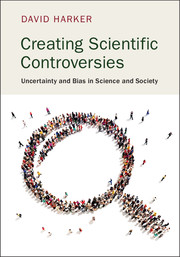Book contents
- Frontmatter
- Dedication
- Contents
- Preface
- Introduction: scientific authority and the created controversy
- Part I Lessons from the Philosophy of Science
- 1 Defining science and the empiricist approach
- 2 Two challenges for the naïve empiricist
- 3 A revolution in how we think about sciences
- 4 Sciences as historically and socially situated
- Points to remember: Part I
- Part II Biases, Arguments and Created Controversies
- Part III Exposing Created Controversies
- Concluding remarks
- References
- Index
1 - Defining science and the empiricist approach
from Part I - Lessons from the Philosophy of Science
Published online by Cambridge University Press: 05 October 2015
- Frontmatter
- Dedication
- Contents
- Preface
- Introduction: scientific authority and the created controversy
- Part I Lessons from the Philosophy of Science
- 1 Defining science and the empiricist approach
- 2 Two challenges for the naïve empiricist
- 3 A revolution in how we think about sciences
- 4 Sciences as historically and socially situated
- Points to remember: Part I
- Part II Biases, Arguments and Created Controversies
- Part III Exposing Created Controversies
- Concluding remarks
- References
- Index
Summary
Insofar as cigarette companies funded research principally to protect industry interests, rather than launching a sincere effort to properly evaluate the health risks associated with their product, we might come to regard their behaviour as unscientific. It is a common feature within discussions of Creation science, evolutionary biology, environmental and health sciences, the search for extra-terrestrial life, ghosts, Bigfoot and so on, that some or other practice, theory, method or conclusion is admonished for mimicking science but falling short of scientific ideals. The prestige that modern society affords science practically guarantees that impassioned debates will erupt over whether some discipline or other does or does not belong. Such sentiments might suggest that the most important task in this book should be that of defining what exactly science is.
Furthermore, it feels quite natural to suppose that, given a little time and ingenuity, we should be able to define science, and thereby distinguish it from other ways of knowing and understanding the world. We talk about science as if the word picks out a single, unified subject, method or discipline. Our schools and universities are organized as if more specialized fields and subject matter either unambiguously do or do not belong to the sciences. We describe a history that appears to enforce the same, general attitude. That history typically begins with Nicolaus Copernicus who, in 1543, published On the Revolutions of the Heavenly Spheres, in which he presented his heliocentric model of the solar system. Although it took almost a century before heliocentricism was widely accepted among scholars, that date is often identified as the start of the Scientific Revolution and the birth of modern science. The phrase itself – ‘the birth of modern science’ – implies that something new appeared, something that has subsequently grown and developed, but, again, some thing that we might hope to identify and define.
One source of trouble for our project arises, however, when we notice that defining science in a historical, or institutional, sense is quite distinct from the project of understanding science as our most reliable means of acquiring knowledge. To illustrate, suppose that we find a reasonable definition for what Copernicus, Galileo, Newton and their intellectual descendants have been doing. We announce that science requires fidelity to these particular methods and assumptions. Suppose now, however, we are presented with studies that don't fit the definition.
- Type
- Chapter
- Information
- Creating Scientific ControversiesUncertainty and Bias in Science and Society, pp. 21 - 36Publisher: Cambridge University PressPrint publication year: 2015



